Share
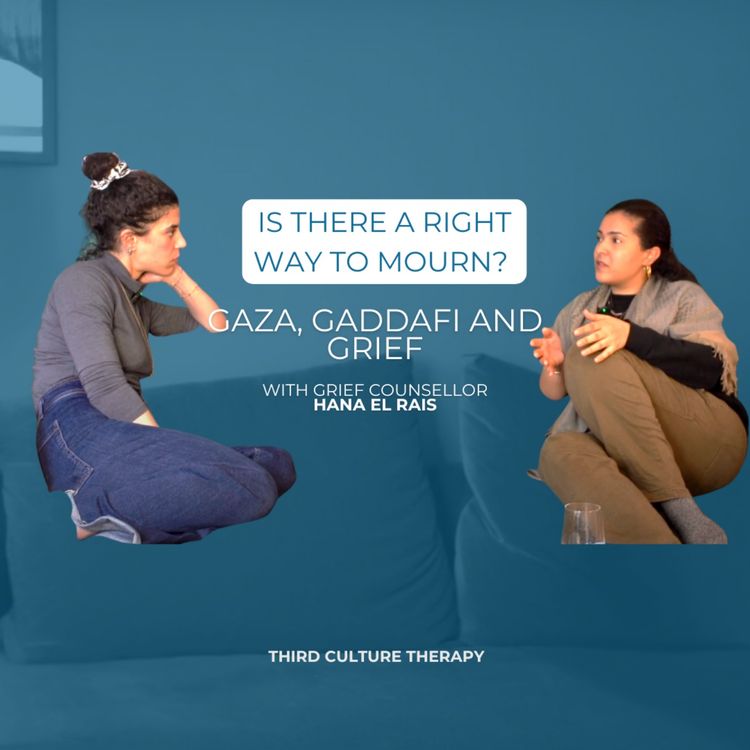
Third Culture Therapy
Is there a right way to mourn? Gaza, Gaddafi and grief – with Hana El-Rais
How can we navigate personal loss while holding space for collective grief during times of crisis?
What does it mean to find healing through the mind, body, and spirit after deep personal and communal trauma?
Hana Elrais, a British-Libyan creative, grief counsellor, and end-of-life carer, joins us to share her unique approach to processing grief and trauma. Founder of Permission to Grieve, where she leads monthly grief circles and one-on-one sessions, Hana uses a holistic approach, including vibrational sound medicine, to create a safe space for others to heal. Drawing from her own experiences of loss—her brother, her marriage, her country—Hana helps others through the complex layers of grief.
Together, we discuss how death and divorce shaped her understanding of loss, her journey through an identity crisis as a Libyan-Brit, and how history played a role in resolving it. Hana also shares how she weaves Sufi practices into her work, and what it's been like to support the Arab and Palestinian community in the UK through grief circles during the ongoing crisis in Gaza.
Join us for an intimate conversation about trauma, healing, and the power of collective grief.
To not miss a single episode, make sure to subscribe to the podcast and follow us on our youtube and instagram, and if you'd like to support our work, consider donating to our Patreon here.
Finally, click this link to hear more from our brilliant guest, Hana.
More episodes
View all episodes
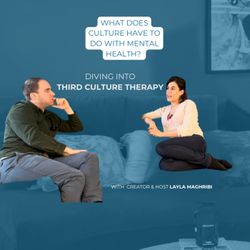
24. What does culture have to do with mental health? Diving into Third Culture Therapy with host Layla Maghribi
51:47||Season 3, Ep. 24How does where we come from impact our mental wellbeing? And why did Layla Maghribi decide to create a podcast about it? We're turning the tables in this insightful episode, as Ned Sedgwick sits down with Layla Maghribi, the creator and host of the acclaimed podcast Third Culture Therapy.Layla Maghribi is a writer, journalist and podcaster. Born in the UK to Libyan/Palestinian and Syrian parents, Layla spent her childhood summers in Damascus and later lived and reported from there at the start of the uprising-turned-civil war. After several years working for international media outlets, including Reuters and CNNI, across the Arab world Layla returned to the UK and over the past few years she has been working on various independent projects, like creating this podcast and writing a book.Tune in to hear Layla share her journey as a third-culture individual navigating the intersection of cultural identities, and how her experiences inspired her to create a platform for others like her. We delve into her motivations, the stories that have resonated the most with her, and the profound lessons she's gained from recent episodes.Whether you’re a third-culture kid yourself, or simply curious about the nuances of global identities, this conversation will leave you inspired and reflective.To make sure you never miss a Third Culture Therapy session, download the pod on your favourite platform and watch us on YouTube here and Instagram here.And you can follow Layla's work here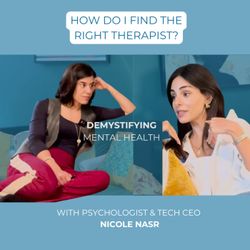
23. How do I find the right therapist? Demystifying mental health with psychologist & tech CEO Nicole
54:14||Season 3, Ep. 23What makes the search for mental health support so challenging? And can technology help make it easier?In this episode, we’re joined by Dr. Nicole Nasr, a psychologist, entrepreneur, and the founder of Journey Starts Here, a platform transforming how clients and therapists connect. Growing up in Montreal, Beirut, and London, Nicole developed a unique perspective on the intersection of culture, identity, and mental health.Tune in to this episode for an exploration on the often-overwhelming process of finding the right therapist, the barriers many people face in accessing care, and how Nicole’s platform is making it easier to connect with mental health professionals. Nicole also gives us a rare look into how mental health practitioners care for their own well-being, and she shares her journey from psychologist to tech innovator, offering insights into how therapy can evolve to meet the needs of a diverse and ever-changing world.To make sure you never miss a Third Culture Therapy session, download the pod on your favourite platform and watch us on YouTube here and Instagram here.And to stay connected with Nicole’s work, follow Journey Starts Here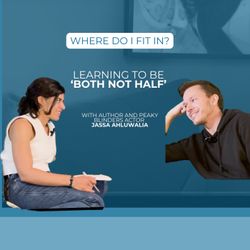
22. Where do I fit in? Learning to be ‘Both Not Half’ with author and Peaky Blinders actor Jassa Ahluwalia
47:32||Season 3, Ep. 22How can you belong if you’re only ever considered “half” of something? How can we redefine identity on our own terms?In this episode, we’re joined by actor, filmmaker, and writer Jassa Ahluwalia. Jassa’s debut book Both Not Half is both a celebration but also a reclamation of the mixed heritage experience, centred around his ethos that we are all more than the sum of our parts. Born in Coventry to a white English mother and a Punjabi Sikh father, Jassa has spent his life navigating overlapping identities, challenging stereotypes, and carving out his own space in the world.We explore Jassa’s personal journey to embrace his Sikh roots, examine his unique philosophy of self-definition, and discuss the lessons he’s learned while advocating for greater representation of mixed heritage voices in the acting industry.To make sure you never miss a Third Culture Therapy session, download the pod on your favourite platform and watch us on YouTube here and Instagram here.If you’d like to support us further, please consider donating to our Patreon here.And to stay connected with Jassa’s work, you can follow him here: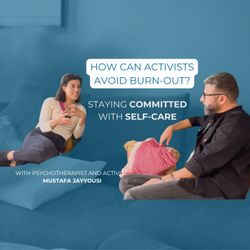
21. How can activists avoid burn-out? Staying committed with self-care, with Mustafa Jayyousi
49:43||Season 3, Ep. 21How can we take care of our mental health while sustaining activism? How can we find strength in our struggles? In this episode, we sit down with Palestinian psychotherapist and activist Mustafa Jayyousi, who specialises in trauma therapy for those facing systemic oppression and mental health care for activists. Mustafa shares his approach to helping activists manage trauma, build resilience, and avoid burnout through workshops designed to support long-term social justice work. He discusses his journey into activism, shaped by his personal experiences, and how he balances his roles as a father and an activist while maintaining close connections to his family in Palestine.We also explore Mustafa’s thoughts on “decolonising” mental health and how breaking from Western frameworks has allowed him and his clients to find more culturally rooted, communal methods of healing. To make sure you never miss a Third Culture Therapy session, download the pod on your favourite platform and watch us on YouTube here and Instagram here.If you’d like to support us further, please consider donating to our Patreon here.And to stay connected with Mustafa’s work, you can follow him on Instagram or his website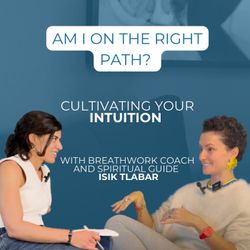
20. Am I on the right path? Cultivating your intuition - with breathwork coach Isik Tlabar
57:30||Season 3, Ep. 20What does it take to truly understand yourself? And how can you unlock your full potential in life?In this episode, I sit down with Isik Tlabar, a life coach and spiritual guide who splits her time between Istanbul and London. Isik helps people connect with their inner power through breathwork, a technique that combines breath, sound, and movement to create a deeper connection between the body and mind.We dive into her approach to self-discovery and why she believes balancing both feminine and masculine energies is essential for personal growth. Isik also shares practical ways to use your intuition as a tool for clarity, purpose, and empowerment.Join us for an inspiring conversation that will leave you thinking about how you can better connect with yourself and live more fully.To not miss a single episode, make sure to subscribe to the podcast and follow us on our youtube and instagram, and if you'd like to support our work, consider donating to our Patreon here. Finally, click this link to find out more about Isik’s work.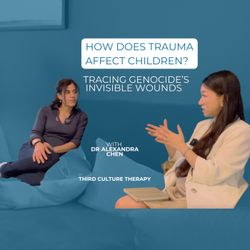
19. How does trauma affect children? Tracing genocide’s invisible wounds - With Dr Alexandra Chen
58:29||Season 3, Ep. 19CONTENT WARNING: This episode contains several mentions of extreme violence and self-harm, particularly involving children. While difficult to talk about and listen to, we felt it right to include these moments to illustrate the severity of the situation and the vital importance of Alexandra’s work. In spite of these difficult conversations, we hope that the episode will leave you feeling more hopeful and provide you with a better idea as to how we should help the most vulnerable. What are the long term effects of war on the children who suffer because of it? And what can we do to help those most in need? In this episode, we sit down with Dr. Alexandra Chen, a Hong Kong-born child psychologist and trauma specialist with over a decade of experience working with war-affected children and families across the Middle East and Africa.Alexandra shares her deep insights into the often-overlooked, long-term impacts of conflict on children’s mental health, cognitive development, and education—drawing on her work with UN agencies, governments, and nonprofits in Syria, Lebanon, Iraq, and beyond.We delve into how Alexandra copes with the emotional weight of witnessing such profound trauma, the strategies she employs to maintain her own wellbeing, and how her diverse identities—from her Hong Kong roots to her experiences in the UK—shape her approach to helping and healing.Join us for a conversation that explores resilience, trauma, and the enduring power of hope in the face of unimaginable adversity.If you are directly impacted by the war in Gaza and require mental health support, follow this link to sign up for support from Healing for Gaza. And if you want to provide support as a clinician or interpreter, or just want to donate to Healing for Gaza, all the information about how to do that can be found here. To not miss a single episode, make sure to subscribe to the podcast and follow us on our youtube and instagram, and if you'd like to support our work, consider donating to our Patreon here.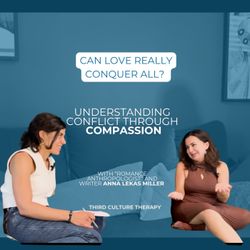
18. Can love really conquer all? Understanding conflict through compassion – with "romance anthropologist" Anna Lekas Miller
56:19||Season 3, Ep. 18How do you stay hopeful when times are hard? And can love truly survive, and even thrive, in the face of adversity?In the first episode of Season 2, we hear from award-winning journalist and writer Anna Lekas Miller, who specialises in conflict and migration. Despite covering distressing events like the Syrian civil war and the rise of ISIS, Anna has always sought stories of compassion and love.Her latest book, Love Across Borders, which recently won the Arab American Book Award, weaves real-life stories of couples navigating conflict and borders. One of those stories is Anna's own relationship with her husband Salem, a Syrian journalist.Together, we explore the power of love in the face of adversity, discuss Anna's upcoming novel, and examine what role stories of hope can play even in the darkest times.To make sure you never miss a Third Culture Therapy session, download the pod on your favourite platform and watch us on YouTube here and Instagram here.We deeply appreciate your support as one of our listeners. If you'd like to support us even more, feel free to donate to our Patreon here.And if you want to hear more from Anna, you can find her brilliant Instagram here:This episode is sponsored by Paradise Fold, the silk hair wrap company. Listen to the episode for a special discount code on all purchases.
Season 3 trailer
00:59||Season 3, Ep. 0Third Culture Therapy host Layla Maghribi announces the return of another season of the podcast with an amazing new line-up of guests!From the impact of hostile foreign policies on love and relationships to the role of art, poetry & literature in healing, Layla goes deep on topics that are both highly personal, and completely universal.Third Culture Therapy will be back on the 25th September - and every other Wednesday after that - so make sure to follow & subscribe wherever you listen to your podcasts and get alerted when the next episode drops. And if you’re a watcher then we are also on YouTube!If you’re new to the show, scroll back & have a listen to previous episodes where i talk to therapists, shamans, tech entrepreneurs, and many more.Like follow and subscribe everywhere you get your podcasts, and follow us on instagram and patreon @thirdculturetherapypod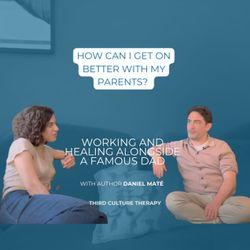
17. How can I get on better with my parents? Working and healing alongside a famous Dad - with Daniel Maté
01:10:31||Season 2, Ep. 17How do a father and son maintain a strong relationship while working together on healing others?Can professional collaboration strain personal family ties?Daniel Mate, musician, author, mental chiropractor, and Palestine advocate, joins us to explore these questions. Co-author of The Myth of Normal with his father, Gabor Mate, Daniel shares insights into their father-son partnership and their joint project, "Hello Again: A Fresh Start for Parents and Their Adult Children."Together, we dive into Daniel’s healing journey, his unique mental chiropractic approach, and the transformative experiences that shaped him, including Ayahuasca in Peru. We also explore the challenges of growing up in the shadow of a famous father and how Daniel has created his own path.We further discuss Daniel’s recent involvement in the Israel-Palestine debate and how his healing work applies to larger societal conflicts. Join us as we discuss personal healing, family collaboration, and activism.To not miss a single episode, make sure to subscribe to the podcast and follow us on our twitter and instagram, and if you'd like to support our work, consider donating to our Patreon here.Finally, to hear more from our brilliant guest Daniel, you can find them on instagram here, and their website here.